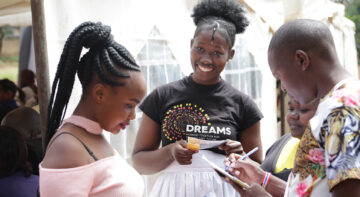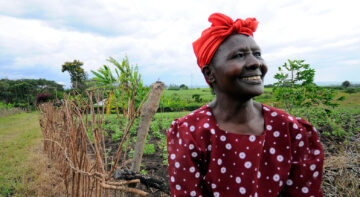News
Stakeholders in population and development have urged the government to invest in teenage girls so as to avert teenage pregnancies and keep girls in school. According to the 2014 Kenya Demographic and Health Survey (KDHS), nationally, 18 percent of teenage girls aged 15 to 19 have begun childbearing.This means that 1 in every 5 girls in this age bracket is pregnant with their first child or already a mother. This year’s World Population Day whose theme is Investing in Teenage Girls was celebrated across the country on 11th July 2016. Specifically, Kenya’s focus was on Ending Teenage Pregnancies.
Speaking at the national celebrations at the Star of Hope Primary school in Viwandani, Nairobi, Dr Josephine Kibaru, the Director General, National Council for Population and Development (NCPD), noted that Kenya has delayed in investing in the youth agenda, especially the girl child.
“Keep teenagers in school so they can make informed choices,” she said. She further emphasized that teenagers, and youth in general, should be empowered with reproductive health information so that they can seek appropriate reproductive health services.
Investing in teenage girls critical for Kenya’s development
“With the right investments today, we can reap benefits in the future,” Dr Kibaru said.
She called upon all stakeholders in population and development to complement each other’s efforts in order to end teenage pregnancy in Kenya and steer the country forward. Investing in girls is key to Kenya’s development and more so for the achievement of a demographic dividend. Similarly, the government should provide a suitable policy environment that will enhance the development of the country’s human capital.
The Cabinet Secretary, Ministry of Devolution and Planning, Hon Mwangi Kiunjuri who was officiating the event, noted that indeed the government recognises the importance of investing in teenagers. “Teenagers are important for the sustainability of development in Kenya,” he said.
Hon Kiunjuri made reference to the constitution of the Anti-Female Genital Mutilation (FGM) Board in 2014, which has placed Kenya on the right path towards eradicating the harmful cultural practice that has been widely practiced in many communities for decades. He also went further to indicate that the government is soon launching a national campaign to end child marriages. Further, he pointed to ongoing projects meant to provide jobs for the youth such as the Uwezo Fund. “Political will goes a long way in enhancing a country’s development,” he emphasized.
Address vulnerability of teenagers
Teenagers are a vulnerable group in the Kenyan population and their sexual and reproductive health needs must be taken seriously. This is a transition period of self-discovery psychologically and physiologically, as their bodies undergo various changes. If left to chance, many will be ill-advised on their sexuality and in most cases the repercussions are dire, including teenage pregnancy.
According to the KDHS 2014, the number of teenage pregnancies increased from 755,000 in 2009 to 843,000 in 2014, despite an increase in the use of contraceptives among sexually active teenagers, from 23 percent in 2009 to 49 percent in 2014. As Hon Kiunjuri highlighted, these are youth who should be in school, but they end up dropping out due to pregnancy.
A teenage girl narrated a moving story about her experience on dropping out of school after she fell pregnant. She advised fellow teenage girls to follow a different path. “Msiitikie kudanganywa “ maboys wanataka kuwa-use, ni ngumu kuwa single mother na ku-hustle when you’re pregnant. Girls in secondary school, pull up your socks. I didn’t want to be a single mother but ilibidi ni-hustle “ I had to do odd jobs to get money to support myself and my baby. I still have hopes of going back to school and pursuing my career.“ (Girls don’t allow yourselves to be lied to “ these boys simply want to take advantage of you. It’s difficult being a single mother and hustling when you’re pregnant. Girls in secondary school, pull up your socks. I didn’t want to be a single mother, but I had to hustle”¦)
Of note, Hon Kiunjuri called upon stakeholders to be inclusive and not leave the boy child out while engaging in advocacy and other interventions.
Keep girls in school
With the 2015 Adolescent Sexual and Reproductive Health (ASRH) Policy in place, concerted efforts are now needed to operationalise the policy. One of the key issues is ensuring that teenage mothers return to school after giving birth. Development experts indicate that education is a “social vaccine’ therefore we need to keep girls in school by ensuring that they complete secondary school and transition to higher education. A good education assures girls and women better sexual and reproductive health outcomes including offering some level of protection against early and unintended pregnancies. Good education includes the provision of age-appropriate comprehensive sexuality education, both in and out of school, for both teenage boys and girls. Increased investments to curb HIV transmission among teenagers is also critical as recent statistics show that HIV is the leading cause of death among adolescents. In addition, fertility rates (defined as the number of children a woman in Kenya can expect to have in her lifetime) need to be reduced in order to curb high population growth rates, to ensure that households have enough resources to educate their teenagers.
The World Population Day celebrations which were also conducted in different counties across Kenya, were organised by various population and development stakeholders including AFIDEP, led by NCPD and the United Nations Population Fund (UNFPA).
Related Posts





